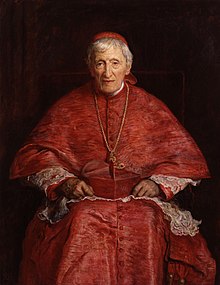John Henry Cardinal Newman
|
Blessed John Henry Newman Cong. Orat. |
|
|---|---|
| Cardinal Deacon of San Giorgio in Velabro | |

Portrait of Newman by
John Everett Millais, 1881 |
|
| Appointed | 12 May 1879 |
| Term ended | 11 August 1890 |
| Predecessor | Tommaso Martinelli |
| Successor | Francis Aidan Gasquet |
| Other posts | Fellow of Oriel College, Oxford; Provost of the Birmingham Oratory |
| Orders | |
| Ordination |
|
| Created Cardinal | 12 May 1879 by Pope Leo XIII |
| Rank | Cardinal deacon |
| Personal details | |
| Born |
21 February 1801 London, England, United Kingdom |
| Died | 11 August 1890 (aged 89) Edgbaston, Birmingham, England, United Kingdom |
| Buried | Oratory House, Rednal, West Midlands, England, United Kingdom |
| Nationality | British |
| Denomination | Church of England (1801–1845); Roman Catholic (1845–1890) |
| Parents | John Newman and Jemina Fourdrinier |
| Alma mater | Trinity College, Oxford |
| Motto |
|
| Coat of arms |  |
| Sainthood | |
| Feast day |
|
| Venerated in | |
| Beatified | 19 September 2010 Cofton Park, Birmingham, England by Pope Benedict XVI |
| Attributes | Cardinal's attire |
| Patronage | Personal Ordinariate of Our Lady of Walsingham |
| Shrines | Birmingham Oratory, Edgbaston, England |
| John Henry Newman | |
|---|---|
 |
|
| Era | 19th-century philosophy |
| Region | Western philosophy |
| School |
Aristotelianism Empiricism Personalism Oxford Movement |
|
Main interests
|
Faith and rationality Religious epistemology Historical theology Christian apologetics Philosophy of education Liberal education |
|
Notable ideas
|
The development of doctrine The illative sense |
John Henry Newman, Cong. Orat., (21 February 1801 – 11 August 1890) was an Anglican priest, poet and theologian and later a Catholic cardinal, who was an important and controversial figure in the religious history of England in the 19th century. He was known nationally by the mid-1830s.
Originally an evangelical Oxford University academic and priest in the Church of England, Newman then became drawn to the high-church tradition of Anglicanism. He became known as a leader of, and an able polemicist for, the Oxford Movement, an influential and controversial grouping of Anglicans who wished to return to the Church of England many Catholic beliefs and liturgical rituals from before the English Reformation. In this the movement had some success. However, in 1845 Newman, joined by some but not all of his followers, left the Church of England and his teaching post at Oxford University and was received into the Catholic Church. He was quickly ordained as a priest and continued as an influential religious leader, based in Birmingham. In 1879, he was created a cardinal by Pope Leo XIII in recognition of his services to the cause of the Catholic Church in England. He was instrumental in the founding of the Catholic University of Ireland, which evolved into University College Dublin, today the largest university in Ireland.
Newman's beatification was officially proclaimed by Pope Benedict XVI on 19 September 2010 during his visit to the United Kingdom. His canonisation is dependent on the documentation of additional miracles attributed to his intercession.
...
Wikipedia
